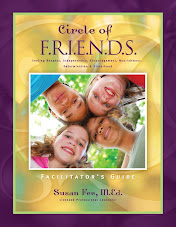On Saturday March 21st, the Cleveland Plain Dealer is planning to run a story by reporter Sarah Crump on relational aggression. I've emailed and spoken with Sarah several times and it appears she will be writing a very well-researched and helpful piece.
At the time the story comes out, I will be attending the American Counseling Association conference, after having spoken at the Tri-State Camping Conference on this very issue. For parents whose girls attend camp, you know that the same issues can take place there too. Just in case parents may be searching for additional information, I wanted to post some tips I shared with Sarah Crump and offer other resources.
First, for girls who are being targeted, here are some tips:
•
Determine what you control. You have no control over other people and circumstances. But, you have full control of how you respond. Your response can influence any situation therefore you’re not helpless.
•
Choose your response. If another girl is being mean to you, there are four ways to respond: ignore her, be mean back, talk to her face-to-face, or tell an adult. While I'm not encouraging being mean back, I'm being honest in saying that it is an option. Most likely, you've already tried it. Now, it's time to honestly assess the best choice.
•
Know the pros and cons. Ignoring a situation may work, but if things continue or get worse, it’s time for another response.
Being mean back may feel good in the moment, but it can also escalate bad feelings. Is it worth it?
Talking face-to-face can increase understanding but doesn’t guarantee cooperation or an apology.
If you’re feeling stuck, the situation is rapidly growing worse, or someone is in danger of being harmed, it’s time to ask an adult for help. Specify the help you want, especially if you fear the adult will take over.
•
Express your stress. We make better decisions when we’re calm. Manage your stress daily through exercise, pursuing hobbies, journaling, talking to a trusted adult, prayer or meditation.
•
Expand your friendships. Develop new friendships so that you’re not relying on one person. Measure healthy friendships by asking yourself, “After I spend time with this friend, how do I feel about
myself?” If the answer isn’t positive, neither is the friendship.
Parents, if your daughter is a target of relational aggression, here are ways you can support her:•
Listen with empathy. Allow your daughter to describe her situation and express her feelings without interrupting, correcting, or minimizing. She needs to feel heard and at the same time, talking out loud helps her understand herself.
•
Coach, don’t solve. Avoid taking over. Help your daughter sort through her options, but be careful about solving her problems. This is her chance to learn valuable conflict resolution skills.
•
Skip empty platitudes. Telling girls, “Just ignore it,” or “That’s just how girls are,” leaves them feeling minimized and hopeless.
•
Ask empowering questions. After your daughter explains her situation ask her, “What do want to do about this?” Help her weigh the pros and cons of her response. Ask her, “What part of this situation do you feel you can control?” to help her set reasonable expectations.
•
Support healthy coping skills. Help your daughter develop healthy ways to manage stress such as exercise, hobbies, journaling, volunteering, faith, and expanding social connections.
I've posted a few videos on
YouTube that you may find helpful. Also, check out my website for my E-Seminar
BFF! (Except When We're Not): A Parent's Guide to Helping Girls Develop Healthy Friendships.
Finally, if you or your daughter would like to see me for counseling, please contact
Lakeshore Educational & Counseling Services at 800-600-5327.






















